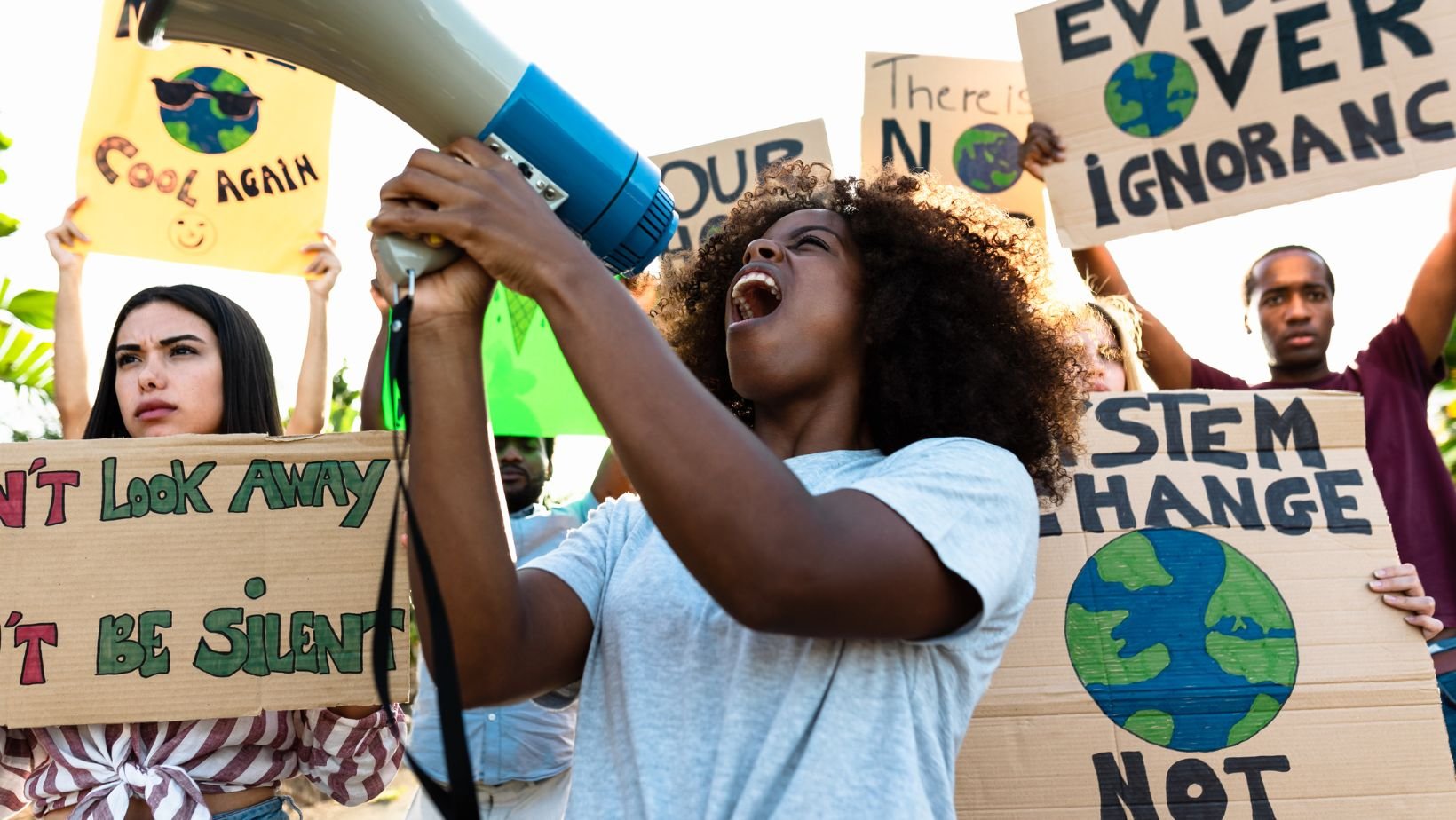Why Fashion Revolution Matters: Reflecting on Fashion Revolution Week 2024
Why Do We Need A Fashion Revolution?
Fashion Revolution - A woman at Jacobswell holding a Fashion Revolution sign (Photo credit: Jacobswell)
Fashion Revolution Week 2024 is an opportune moment to ponder why this movement holds such significance. For a decade now, Fashion Revolution has been more than just a campaign; it's a catalyst for change in an industry fraught with issues, ranging from unethical labour practices to environmental degradation. In this blog post, we delve into the pressing reasons why a Fashion Revolution is not just desirable but absolutely necessary in today's world.
Rana Plaza: The Tragedy that Sparked the Fashion Revolution
On April 24, 2013, the Rana Plaza factory collapse in Bangladesh sent shockwaves through the world, claiming the lives of over 1,100 garment workers and injuring thousands more. This tragic event not only exposed the harsh realities of the fashion industry but also ignited a global movement for change known as the Fashion Revolution.
The Rana Plaza disaster was a devastating culmination of neglect, exploitation, and greed. Workers, many of whom were paid poverty wages, were forced to enter the structurally unsound building despite warnings of cracks. When the building collapsed, it exposed the dark side of the fashion industry, where profit often takes precedence over the safety and well-being of workers.
.
The Birth of Fashion Revolution
Out of the rubble of Rana Plaza emerged a powerful movement for change: Fashion Revolution. Founded on the belief that fashion should be transparent, ethical, and sustainable, Fashion Revolution calls for greater transparency in the fashion supply chain and advocates for the rights of garment workers worldwide. The simple question, "Who made my clothes?" became a rallying cry for transparency and accountability in the industry.
Ask the question “Who makes my clothes?” This is Ammu at Jacobswell
1. Transparency Breeds Accountability:
One of the central beliefs of Fashion Revolution is transparency. By asking brands #WhoMadeMyClothes, consumers demand accountability throughout the supply chain. Transparency sheds light on the often hidden processes behind garment production, from the working conditions of factory workers to the environmental impact of manufacturing. Only when brands are transparent can they be held accountable for their actions, leading to improved practices and ethical standards.
At Jenerous we’re committed to being transparent and you can find out more about who made our clothing on our Partners and Suppliers page. You can also find more details about the women who make our clothing such as Ammu pictured above, in our blog Find Out Who Makes Our Clothing.
2. Human Rights Are Non-Negotiable:
The Rana Plaza tragedy in 2013 served as a stark reminder of the human cost of fast fashion. Over 1,100 garment workers lost their lives due to unsafe working conditions. Fashion Revolution emerged from this tragedy, advocating for the rights and dignity of workers worldwide. In 2024, as we commemorate the 10th anniversary of Fashion Revolution Week, the work continues to ensure that every individual involved in the production of clothing is treated with respect and fairness.
We believe that garment workers deserve fair wages, safe working conditions and respect. That’s why we work with Fair Trade Enterprises who are governed by the 10 Principles of Fair Trade, which ensures that people and the planet are put first. You can read more detail about these 10 principles on the WFTO website.
3. Environmental Sustainability is Imperative:
The fashion industry is one of the most polluting sectors on the planet, contributing to water pollution, deforestation, and greenhouse gas emissions. Fast fashion's reliance on cheap materials and disposable trends exacerbates these environmental challenges. Fashion Revolution calls for a shift towards sustainable practices, including the use of eco-friendly materials, reduction of waste, and adoption of circular economy principles. As we confront the realities of climate change, embracing sustainable fashion is not just an option but a necessity for the health of our planet.
You can find out more about how we are prioritising sustainability on our sustainability page.
Fashion Revolution Week - Be a fashion activist and demand a better fashion industry, one that prioritises people and plant above profit margins
4. Empowering Consumers to Drive Change:
Fashion Revolution empowers consumers to become agents of change in the fashion industry. Through education, activism, and conscious consumption, individuals can influence brands to prioritize ethics and sustainability. By choosing to support transparent and responsible companies, consumers send a powerful message that they demand a fashion industry that values people and the planet over profit margins.
The theme for the 2024 campaign is centred around How to be a Fashion Revolutionary. Inspired by the work of the Fashion Revolution global community over the last decade, and focusing on what it means to be part of the revolution and what fashion activism looks like for the future.
We all have a part to play in making the fashion industry better. Become a fashion activist and share your story with #WeAreFashionRevolution. Find out more over at the Fashion Revolution site.
Fashion Revolution Week
As Fashion Revolution Week 2024 comes to a close, let us reflect on the vital importance of this movement. From demanding transparency and accountability to championing human rights and environmental sustainability, Fashion Revolution embodies the collective effort to transform the fashion industry for the better. In the months and years to come, may we continue to advocate for a fashion world that is fair, ethical, and truly revolutionary. We are proud to be playing our part in changing the fashion industry.





